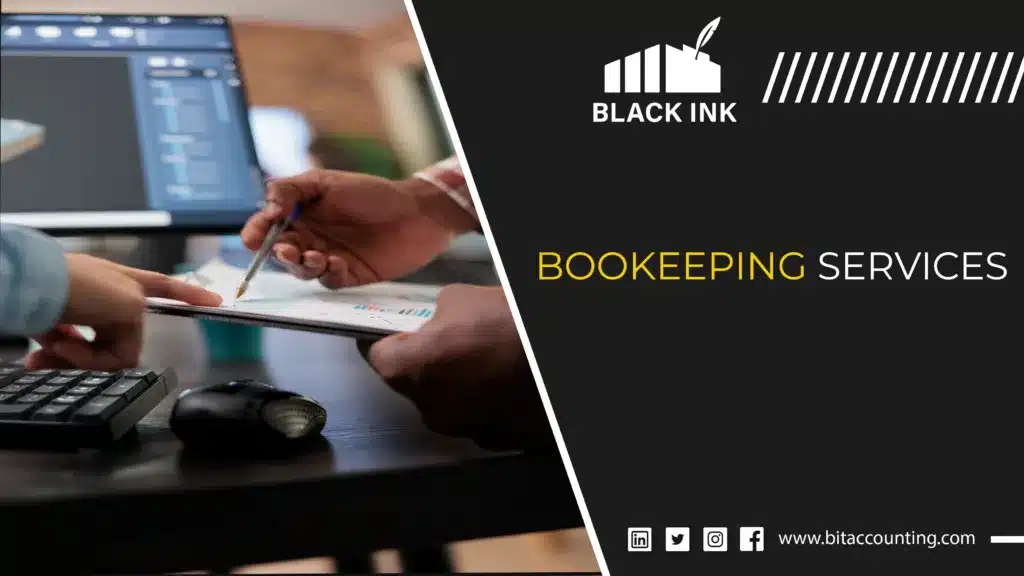
Table of Contents
Who Really Needs Bookkeeping Services? Complete Guide 2025
Running a business may look easy on the outside, sitting on the chair in an air-conditioned office and pretending to be a CEO in a nice suit, but it’s nothing like that. A successful running business comes with a set of endless responsibilities, and by responsibility we mean managing inventories, tracking the company’s growth, and most importantly keeping your books in order. Most common mistakes business owners do is they don’t keep track of finances and their books until the tax season arrives and a chaos takes place and you start wondering, do I really need bookkeeping services? And if you are a business owner who is in this situation right now, you are not alone.
Many business owners struggle to figure out when it’s the time to hire a professional bookkeeper who can set their finances in order.
Here we are gonna end this struggle for you by guiding you and providing the best bookkeeping service out there.
What Are Bookkeeping Services?
Bookkeeping services are professional solutions that help individuals and businesses record and organize financial transactions.
Think of it as the process of keeping your business’s financial heartbeat strong and steady. It involves tracking:
- Invoices
- Payments
- Receipts
- Payroll
- Tax filings
- Bank reconciliations
Bookkeeping is the foundation of accounting and finance. Without it, your financial records become chaos and that chaos leads to costly mistakes, ending with penalties and audits and trust us, no one wants the IRS knocking on their door.
What Bookkeeping Services Actually Do?
You might be surprised at how much bookkeepers really do behind the scenes. They’re not just “number crunchers”—they’re the gatekeepers of your financial health.
A professional bookkeeping service typically includes:
- Recording daily transactions (sales, purchases, receipts)
- Reconciling bank accounts
- Processing payroll and tax withholdings
- Generating monthly financial statements (Profit & Loss, Balance Sheet)
- Invoicing and managing accounts receivable/payable
- Preparing for tax season
Some even offer tax filing assistance and work in sync with your CPA or accountant.
If you’re still using Excel or a notebook, these services can completely transform how you understand your money—and your business.
Do You Actually Need Bookkeeping Services?
Here’s the real talk: not every business needs a full-service bookkeeping firm—but most businesses could definitely benefit from one.
So how do you know if you really need this service?
Ask yourself these questions:
- Are you spending concerning amounts of hours just trying to track your income and expenses?
- Have you ever missed a tax deadline or did not pay your tax properly just because your books weren’t organized?
- Are you growing fast, hiring people, or opening new branches?
If you answered yes to even one of those questions, hiring a bookkeeping service might be the right time.
Not just big corporations even freelancers, eCommerce sellers, consultants, and real estate agents, they’re all turning to bookkeeping experts, just so they can run their work with peace of mind
How Can You Find The Right Service?
Great question. With hundreds of firms and online platforms promising financial peace of mind, how do you choose the right bookkeeping service?
Here we have a proper and clear roadmap:
Choosing a bookkeeping service shouldn’t be a game of guess the word, it should be a precise decision:
Step 1: Always Know What You Need
- Are you a freelancer, startup, or established business?
- Do you need basic transaction tracking or full payroll and tax support?
- What’s your monthly transaction volume?
When you know what your work needs, then the list of options isn’t that big.
Step 2: Decide Between On-site vs. Outsourced
- In-house bookkeepers offer hands-on, dedicated support.
- Outsourced services are more affordable, scalable, and cloud-integrated.
This is an important step because both things are profitable according to your situation.
Step 3: Always Choose The Right Software
- Ask what tools the provider uses: QuickBooks Online, Xero?
- Make sure it integrates with your current systems.
If the provider is using the free to use software, don’t go there.
Step 4: Check If They Are Experienced
- Have they worked in your industry?
- Can they handle your work?
- Ask for case studies and proof of their work.
The more the experienced your provider is, the more peace you will have in your future.
Step 5: Understand Their Style of Work
- Will they meet monthly? Do they provide dashboards or summaries?
- Do they deal with complex situations properly?
You want a partner, not a piece of machine.
Step 6: Review Cost vs. Value
- Don’t just look for the cheapest option—look for ROI.
- A $500/month service that saves you 10 hours and prevents a $5,000 IRS penalty is a win.
Ask yourself: What’s the cost of not hiring them?
Step 7: Get Everything in Proper Documents
- Review the engagement letter or service agreement.
- Understand their responsibilities, pricing model, and what’s included.
Clarity avoids conflicts.

What Do You Actually Need From Bookkeeping Services?
Before you Google “bookkeeper near me” or sign up for an app, take a step back. What do you actually need?
Every business is different, and your bookkeeping solution should reflect your unique size, industry, and challenges.
Here are 5 things to consider before hiring:
1. What Should You Consider About Accounting Software?
Does the bookkeeper work with QuickBooks, Xero, Zoho Books, or another tool you’re already using—or are comfortable switching to?
The best bookkeeping services in 2025 are tech-savvy. They’ll not only use cloud-based platforms for secure access but can also integrate your POS systems, payroll software, and CRM tools.
If they’re still relying on spreadsheets or handwritten ledgers, run.
2. Are They Local?
While remote bookkeepers are increasingly popular (and often more affordable), sometimes local is better—especially if:
- You need someone to pick up physical receipts or documents
- You prefer face-to-face meetings
- You want a bookkeeper familiar with state-specific regulations
That said, the rise of virtual bookkeeping services means even remote teams can offer personalized support, video calls, and shared dashboards.
3. Do They Understand Your Business?
A bookkeeper who specializes in construction firms may not be the best fit for a SaaS startup or digital marketing agency. The nuances matter.
- Are you project-based?
- Do you manage inventory?
- Are you navigating international payments?
Always ask: “Have you worked with businesses like mine before?” Their answer can make or break your experience.
4. Do They Come Recommended?
Referrals are gold. Ask fellow business owners or your CPA for recommendations. Online reviews are great, but word-of-mouth often reveals the truth faster.
You can also browse the BitAccounting blog for vetted insights into choosing financial professionals—we’ve seen what works and what doesn’t.
5. Do You Actually Need a Full-Service Accountant?
There’s a difference between a bookkeeper and an accountant.
- Bookkeepers handle daily financial tracking and reports.
- Accountants analyze, interpret, and file taxes.
If you’re still small and only need regular transaction recording and payroll tracking, bookkeeping services may be more cost-effective than hiring a CPA.
However, many firms (like ours at BitAccounting) offer hybrid services, where bookkeeping and accounting come as a package—so you don’t have to choose.
Why DIY Is Not Ideal?
It’s tempting to do it all yourself—especially when money is tight. But let’s be honest: DIY bookkeeping rarely ends well.
- You may mis categorize expenses.
- You might forget to reconcile bank accounts.
- You’ll probably miss out on major tax deductions.
Worst of all? You’ll burn precious time on admin instead of growing your business.
Outsourcing bookkeeping doesn’t just clear your plate—it sets the foundation for accurate taxes, strategic decisions, and stress-free audits.
What Is the Role of Bookkeepers?
Let’s clarify what bookkeepers do (and don’t do).
What They do?
- Keep accurate financial records
- Help prepare for tax filings
- Make sure cash flow is visible and organized
- Work with your accountant to provide clean data
What They don’t?
- Give financial or tax advice (unless they’re licensed CPAs)
- Represent you in audits (again, that’s a CPA’s job)
- Handle big-picture financial planning
Still, they’re the first line of defense against financial chaos. Without clean records, your accountant can’t work, your reports are unreliable, and your decisions are based on guesswork.
How a Bookkeeping Service Benefits Your Business?
You don’t need to wait until something goes wrong to see the value in a bookkeeping service. Here’s how it pays off—immediately.
Time Savings
No more weekends wasted balancing books or calculating sales tax.
Better Financial Clarity
Know exactly where your business stands, at any time.
Tax-Ready Reports
Come tax season, you won’t scramble to assemble documents.
Strategic Insights
Use accurate data to make better hiring, pricing, or investment decisions.
Peace of Mind
Sleep better knowing everything is compliant, backed up, and accounted for.
Conclusion
Hopefully you got your answer of who really needs bookkeeping services.
It really doesn’t matter if you are a freelancer, or business owner, handling your finances and books does get overwhelming as they pile up.
At BitAccounting, we have licensed experts who know their stuff, so you can relax while we will take care of the pile you have collected the whole year until the tax season arrived.
FAQs
1. How much do bookkeeping services cost in 2025?
Prices vary widely—freelancers might charge $25–$50/hour, while firms offer packages from $300/month to $1000+, depending on the complexity of your books and services offered.
2. Can I use bookkeeping software instead of hiring someone?
Yes—but only if you’re confident and consistent. Even with tools like QuickBooks, mistakes are easy to make. Many businesses benefit from having a professional oversee or clean up the records periodically.
3. What’s the difference between a bookkeeper and an accountant?
Bookkeepers track daily transactions and keep records organized. Accountants interpret those records, offer financial advice, and file taxes.
4. How often should bookkeeping be done?
Weekly or monthly is ideal. Delaying longer makes records messy and reconciliation harder.
5. Is virtual bookkeeping safe?
Absolutely—reputable services use bank-level encryption, cloud backups, and secure portals. Just make sure your provider is certified and experienced.
GET FREE QUOTE FOR ALL OF OUR SERVICES
Black Ink will send you a free analysis of your current state and what would be the cost of managing either a separate accounting and bookkeeping services or a complete solution across New York, USA. Do get in touch and we will be happy to consult you with our bookkeeping services in NY, New York, USA.
